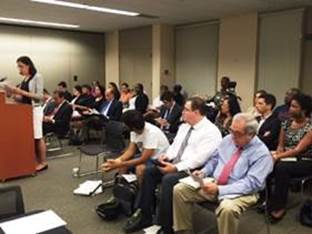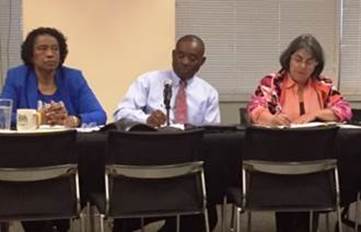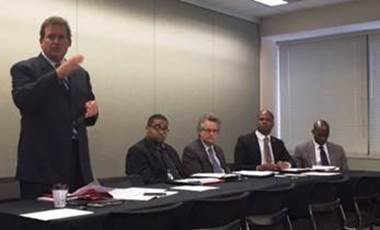Chairman's Council for Prosperity Initiatives holds its third meeting



(L-R) Dr. Emily Eisenhauer from University of Miami; Commissioner Barbara J. Jordan, Chairman Monestime, and Commissioner Daniella Levine Cava; and Mario Artecona from Habitat for Humanity of Greater Miami at the Chairman’s Council for Prosperity Initiatives meeting
(MIAMI-DADE, FL) – Miami-Dade County Commission Chairman Jean Monestime, Commissioners Barbara J. Jordan, and Daniella Levine Cava hosted the third Chairman’s Council for Prosperity meeting on June 3 at the Stephen P. Clark Center in Miami, Florida. The topic of discussion was housing.
Dr. Emily Eisenhauer, Program Coordinator from University of Miami’s Office of Civic and Community Engagement, spoke about affordable housing in Miami-Dade County. James Carras, Public Policy Adjunct Lecturer from Harvard Kennedy School, discussed via teleconference some regional housing trends and workforce housing (sometimes referred to as inclusionary zoning), and Habitat for Humanity of Greater Miami Chief Executive Officer Mario Artecona spoke about owning versus renting a home.
When Miami-Dade County Commissioner Jean Monestime became Chairman, along with changing the committee structure, he created the Chairman’s Council for Prosperity, appointing Commissioners Barbara Jordan and Daniella Levine Cava to work on the council’s goal of increasing gainful employment opportunities, reducing barriers to homeownership, and reducing transportation costs. At the Council’s two previous meetings on March 23 and April 27, members discussed possible ways of bridging the income inequality gap and various employment opportunity initiatives.
The Chairman believes that goals can be achieved by having ongoing dialogues with members of the Council, inviting national experts to the Council’s meetings, and conducting surveys of other regions to develop an inventory of proven initiatives and tested policies. The American Community Survey ranks Miami-Dade County as having one of the highest levels of income inequality among the top 10 most populated counties in the U.S. The Council is focused on increasing gainful employment opportunities, reducing barriers to homeownership, and reducing transportation costs.
